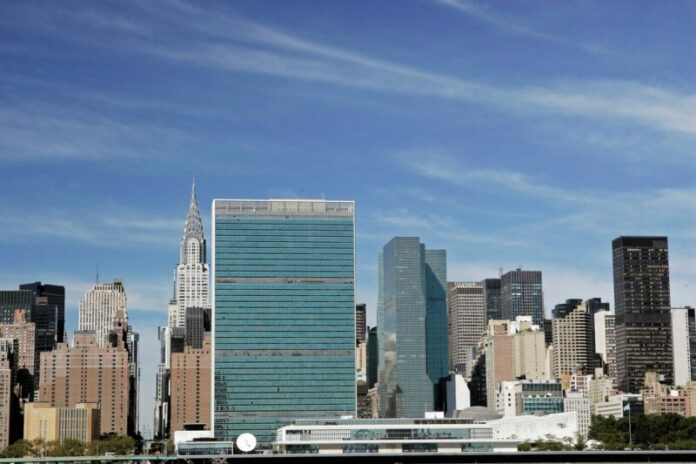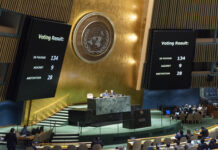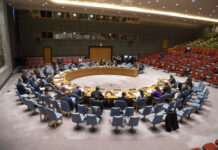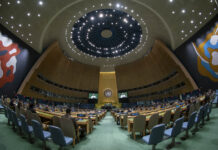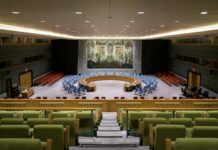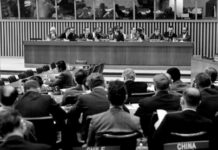This is the News in Brief from the United Nations.
Gaza: Rafah now a ‘pressure cooker of despair’ as exodus south continues
Thousands of Gazans have continued to flee intense hostilities in Khan Younis towards the massively overcrowded southern city of Rafah, which UN humanitarians described as a “pressure cooker of despair” on Friday.
The warning from the UN aid coordination office, OCHA, comes nearly four months since Israel commenced a devastating bombing campaign in response to Hamas-led terror attacks on southern Israeli communities on 7 October.
OCHA spokesperson Jens Laerke said that in recent days, thousands of Palestinians had fled south to Rafah, which already hosts over half of Gaza’s 2.3 million people:
“It’s like a pressure cooker of despair, people living in the open air, in the street. Our vehicles can hardly move simply because there are tents all over the place. So, what I can say about that, is we fear for what comes next…Are they truly safe? No.”
To date, 100,000 people in Gaza “are either dead, injured, or missing and presumed dead” because of bombing raids and fighting on the ground between Israeli soldiers and Palestinian militants, according to the UN World Health Organization (WHO).
The UN agency noted that 60 per cent of the more than 27,000 fatalities reported by the enclave’s health authorities are women and children.
Aid obstacles impacting 90 per cent of Sudan’s most vulnerable
An urgent call now from UN humanitarians to Sudan’s warring sides for access to the wartorn country’s most vulnerable communities who’ve become trapped by the conflict.
In its appeal on Friday, the UN World Food Programme (WFP) warned that the situation in Sudan was dire and that a hunger catastrophe was “looming”.
WFP Communications Officer for Sudan Leni Kinzli said that the UN agency is only able to regularly deliver urgent food assistance to one in 10 people who face emergency levels of hunger:
“That means 90 per cent of the people who are the hungriest are not getting assistance. These people are largely trapped in conflict hotspots, including Khartoum, Darfur, Kordofan and now Jazeera state, where conflict spilled over in December.”
The recent flare-up in fighting shut down a vital humanitarian hub in Gezira state which had supported over 800,000 people a month. WFP is now trying to obtain security guarantees to resume operations in the area to reach vulnerable families who are trapped and urgently need food assistance.
Latest data indicates that the number of people going hungry in Sudan has more than doubled in the last 12 months; an estimated five million now suffer from emergency levels of hunger because of conflict in Khartoum, Darfur, Kordofan and elsewhere.
Taliban dress code arrests of women and girls must end: UN experts
In Afghanistan, the reported arrest of scores of women and girls for allegedly violating the Taliban’s strict dress code has been condemned by top UN-appointed independent rights experts.
The arrests began in western Kabul – an area lived in mainly by the persecuted Hazara community – before taking in primarily Tajik populated areas in the capital and then other provinces, including Bamiyan and Kunduz.
“Women and girls were forcibly taken into police vehicles and accused of wearing a ‘bad hijab’ and held incommunicado,” said the rights experts, who report to the Human Rights Council in Geneva.
They noted that arrests had happened “in shopping centres, schools and street markets” following an order issued to all women to observe “proper hijab” guidelines in public. This involved preferably wearing a loose black garment covering the body and face called a “chadari”.
The order also made male relatives responsible for enforcing the ban or face punishment, according to the rights experts, who described how women and girls were held in overcrowded spaces in police stations and reportedly subjected to physical violence and intimidation.
Since the Taliban took power in August 2021, the situation of women and girls has been systematically undermined by authorities, the experts stressed.
Daniel Johnson, UN News.
Source of original article: United Nations (news.un.org). Photo credit: UN. The content of this article does not necessarily reflect the views or opinion of Global Diaspora News (www.globaldiasporanews.com).
To submit your press release: (https://www.globaldiasporanews.com/pr).
To advertise on Global Diaspora News: (www.globaldiasporanews.com/ads).
Sign up to Global Diaspora News newsletter (https://www.globaldiasporanews.com/newsletter/) to start receiving updates and opportunities directly in your email inbox for free.


